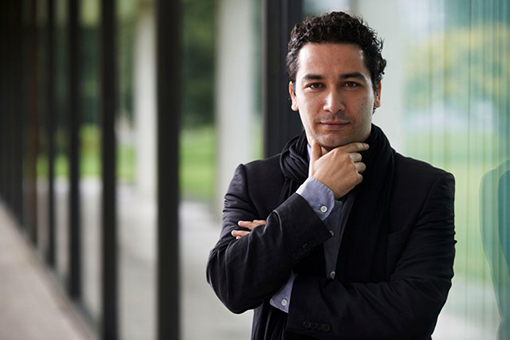Houston Symphony’s glorious “German Requiem” gets an assist it doesn’t need

Andrés Orozco-Estrada led the Houston Symphony Orchestra in “A German Requiem” by Johannes Brahms Friday night at Jones Hall. Photo: Martin Sigmund
The Houston Symphony finished tuning and fell silent. Behind it, the Houston Symphony Chorus perched on its risers, no doubt warmed up to begin Johannes Brahms’ A German Requiem. Jones Hall’s house lights and stage lights dimmed until the room was almost completely dark, and familiar words flashed onto the supertitle screens:
“Give me your tired, your poor, your huddled masses yearning to breathe free … ”
No, that isn’t how the requiem starts, obviously. But on Friday night a quotation from a famous figure — from George Washington and Desmond Tutu to Leonard Bernstein and Bob Dylan — preceded each movement.
Did the musings and declarations enhance Brahms’ music? Not really. When the additions addressed worldly topics — such as immigration to the United States, in the case of Emma Lazarus’ words for the Statue of Liberty — they led in directions Brahms evidently did not have in mind. When they expressed the same idea as Brahms’ Bible verses, they were redundant: Blind author Helen Keller’s statement that in heaven she will be able to see, may have added a feel-good note, but it paled next to Brahms’ titanic depiction of Judgment Day and the raising of the dead.
It wasn’t as though Brahms’ message of hope and consolation needed help speaking to an audience. And it wasn’t as though conductor Andrés Orozco-Estrada and company needed help making the music compelling.
The Houston Symphony Chorus went beyond singing with fullness, precision and vigor. Its gentleness made the opening movement tender rather than solemn. Its warmth and smoothness let the idyllic “Wie lieblich” exude serenity. Its unity and power gave Judgment Day’s tumult a visceral impact.
The chorus’ clarity helped Brahms rich-textured music weave its spell. In the exuberant fugues, dynamic turns of phrase rang out clearly as they jumped from one section of the choir to another. Brahms’ lyricism floated gracefully among sections in “Wie lieblich,” and when a long, sleek line periodically took flight, the results were even more mellifluous.
Even though the chorus sang a German text to a largely English-speaking audience, its near-crystalline diction made a difference.
In the chorus’ very first phrase, “Selig sind” — meaning, blessed are, as in they who mourn — the final “d” was lightly audible, rather than lost as it usually is. Thanks to its presence, the simple, poignant and much-repeated motif ended neatly rather than just dissolving. When the sixth movement invoked words from Hebrews about having no permanent home, the chorus’ crisp consonants helped the orchestra’s plucked strings conjure the music’s restless aura. So those moments had intensity, even though they were quiet.
Baritone Russell Braun brought “Herr, lehre doch mich” a resonance that lent gravity to the text’s plea for humility. When he pulled his voice back for a more introspective tone, it was sometimes a little tremulous. But when he launched into the description of Judgment Day, Braun’s hefty, full-throated singing let him match the chorus’ wallop.
Brahms gave the soprano soloist only one solo, but Nicole Heaston made it count. Her voice welled up with a richness and generosity that let Brahm’s soaring lines reach out like an embrace. For music that describes giving and finding comfort, that was just right.
Orozco-Estrada and the orchestra both supported the voices’ lyricism and redoubled their power.
In the soulful, spacious movements, Orozco-Estrada and the group brought the music a resonance and flow that lent it weight without bogging it down. The players’ vigor and incisiveness filled the exuberant fugues with energy, and their agility helped detonate Judgment Day’s churning and explosions.
The orchestra brought to “Wie lieblich” a sleekness and lilt that complemented the choir’s finesse. And the group’s glowing tone helped the last movement come across like a promise of happiness to come.
The concert opened with Mozart’s Clarinet Concerto, a work with its own kind of soulfulness — especially the way Orozco-Estrada and the orchestra’s principal clarinetist, Mark Nuccio, shaped it Friday.
Since coming to Houston from the New York Philharmonic in 2016, Nuccio has turned in an array of colorful and eloquent solos. Mozart’s concerto brought Nuccio to center stage at Jones Hall for the first time. A chamber-sized contingent of the orchestra, led by Orozco-Estrada, played with an airiness and alertness that left Nuccio plenty of room to maneuver. And to this work he brought finesse and nimbleness galore.
Whether he was caressing Mozart’s melodies or zipping through filigree, Nuccio gave a deft turn to every phrase. He could encompass leaps between registers in a single, seamless line, or vault between ranges as if his single instrument contained two voices — one high and sweet, the other deep and mellow.
Some of the first movement’s restlessness and the finale’s impish humor may have been lost amid the elegance. But Nuccio and Orozco-Estrada gave the slow movement a particularly ethereal, otherworldly cast. That may have paved the way for Brahms.
The program will be repeated 8 p.m. Saturday and 2:30 p.m. Sunday at Jones Hall. houstonsymphony.org;713-224-7575.
Posted May 06, 2018 at 5:55 pm by Tony Welsh
Wonderful performance! Can someone remind me of the George Washington quote?
Posted May 06, 2018 at 7:42 pm by GEORGE JOHN
We attended Sunday. These works are old friends. I have never heard them played better. The Brahms shook me to my core. This orchestra is performing at an unusually high level of excellence. The chorus did very well, too. I hope you heard the Strauss last week. That was an exceptional performance.